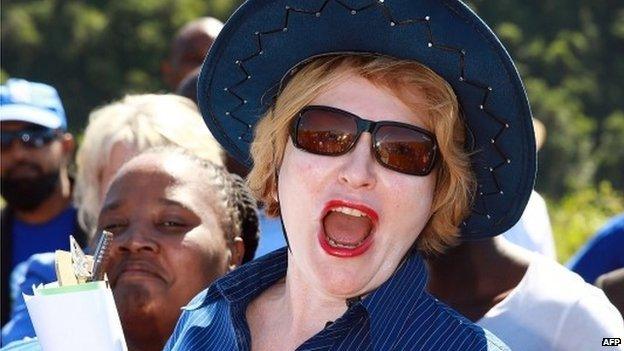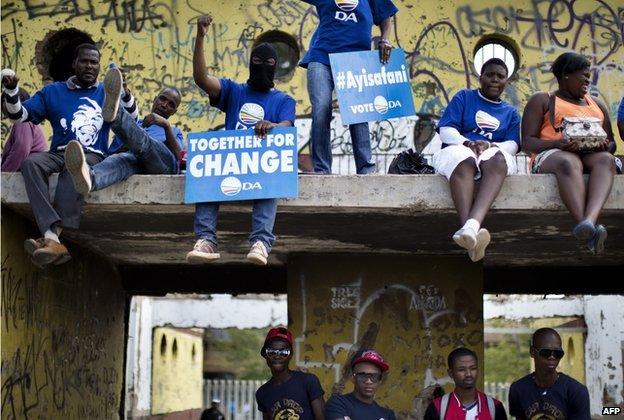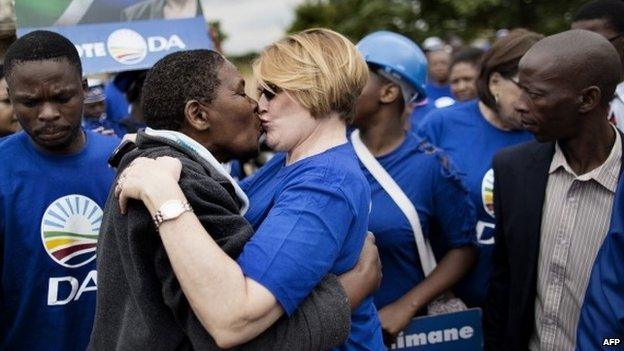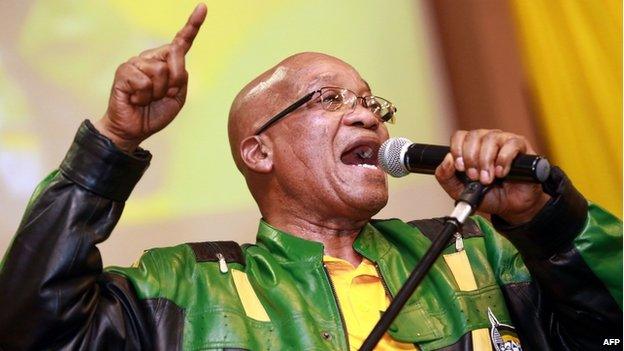Helen Zille of South Africa's Democratic Alliance - a profile
- Published

Once a prominent journalist and anti-apartheid activist, Helen Zille is the leader of South Africa's main opposition party - the Democratic Alliance (DA).
She had promised to lead a "realignment" of South African politics after the DA's defeat in the 2009 election, hoping to create a united opposition that would challenge the governing African National Congress (ANC) for power in this year's national election.
But on this measure, she has failed.
Ms Zille, 63, did manage to persuade the tiny Independent Democrats (ID) to merge with the DA in 2010.
But a proposed merger with the newly formed Agang party - led by Mamphela Ramphele, a former World Bank managing director and anti-apartheid activist - collapsed within a week of its announcement in January this year.
For Ms Zille's critics, it showed that she lacks the political acumen and credibility to reach out to the black majority in a country still polarised along racial lines after centuries of white minority rule.
Writing in South Africa's leading financial daily, Business Day, journalist and former DA worker Gareth van Onselen argues that she launched the party's 2009 election campaign on a positive note, trying to show that it was "a home for black South Africans".

Only a small number of black voters supported the DA in the 2009 polls
However, she then slipped back to a position of comfort by launching "vitriolic" attacks on the ANC, designed to generate "fear more than hope".
"When she isn't baiting people, she is trying to bite their heads off or denigrating the ANC... Her brand is entrenched as one defined by hostility and hyper-defensiveness," he wrote.
"There remains an important place for critical oversight in South Africa today but the DA achieves nothing by emphasising a strident message of opposition over one of belonging, solutions and diversity," he added.
Greatest scoop
But for her supporters, Ms Zille - born in March 1951 to German immigrants - is the defender of South Africa's liberal constitution, keeping a check on the ANC's overwhelming power.
For them, this is best reflected in her relentless campaign to haul President Jacob Zuma before the courts following allegations that he took bribes from businessmen and used government money to upgrade his private rural residence at a cost of about $23m (£13.8m).
"The ANC doesn't believe in separating party and state. President Zuma believes liberation means unfettered power for the ANC," Ms Zille said in a 2012 BBC interview.
"The ANC is a mortal threat to our constitution," she added.
Long before pursuing a career in politics, Ms Zille was a journalist with the now-defunct liberal Rand Daily Mail newspaper.

Ms Zille is trying to increase her support among black people

She has been a fierce critic of President Jacob Zuma
Her greatest scoop as a political reporter came in 1977 when she uncovered how black consciousness activist Steve Biko - Ms Ramphele's partner - had been tortured to death while in police custody.
Multilingual
In doing so, she disproved the official version that he had died of natural causes and established her credentials as an opponent of apartheid.
Later, Ms Zille worked for the Black Sash, a civil rights group which the late Nelson Mandela once described as the "conscience of white South Africa" during the apartheid era.
When apartheid collapsed following the unbanning of the ANC and other liberation movements in 1990, Ms Zille - a married mother of two - joined the tiny Democratic Party (DP), which mostly represented South Africa's English-speaking white liberals.
It later rebranded itself as the DA, incorporating many Afrikaners who threw their weight behind it after it vowed to "Fight Back" against their erstwhile enemy, the ANC, in the 1999 election campaign.
Ms Zille became DA leader in 2007, fuelling hopes in party ranks that as a former anti-apartheid activist fluent in Xhosa, one of the main indigenous languages, she would rebrand the party and win over many black voters.
But recent opinion polls by Ipsos put the DA support among black voters at just 6%.
"If it holds onto that [percentage in the election], or secures a touch more, it would represent about 4% growth among black voters since 2009. Back to the drawing board," Mr Van Onselen said.
Ms Zille is the premier of Western Cape - the only province the ANC did not win in 2009. A majority of the province's residents are coloured, or mixed-race, and they form a key DA constituency.
To broaden the DA's appeal, Ms Zille has elevated black people to top posts in the party - including Lindiwe Mazibuko as parliamentary leader and Mmusi Maimane as its national spokesman and premier candidate in Gauteng - the province which includes Johannesburg and Pretoria, and which the party is targeting in the 7 May election.
Speculation is rife in political circles that Ms Zille is fighting her last election as DA leader, and she will back either Ms Mazibuko or Mr Maimane as her successor to signal her determination to end racial polarisation in South African politics.
She has already shown she is willing to step aside, by saying Ms Ramphele would be the presidential candidate of their short-lived coalition.